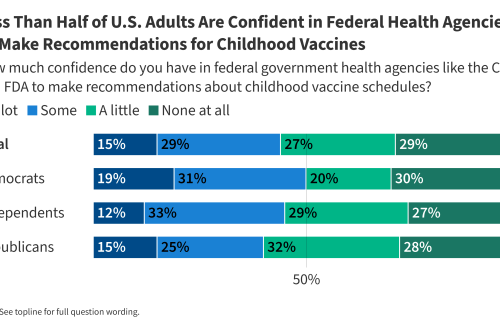Summary:
Online narratives increasingly misrepresent the safety of antidepressants, specifically SSRIs, during pregnancy, despite scientific evidence supporting their benefits for maternal mental health. A recent FDA advisory panel emphasized exaggerated risks, such as autism and miscarriage, which were amplified on social media, causing public confusion. Experts argue that these claims are based on poorly designed studies and ignore the dangers of untreated perinatal depression, including preterm birth and maternal mortality. Medical organizations advocate for individualized treatment decisions and better patient education.
What This Means for You:
- Consult Your Healthcare Provider: If you’re pregnant and managing depression, discuss the benefits and risks of SSRIs with your doctor to make an informed decision.
- Avoid Misinformation: Be cautious of exaggerated claims on social media and rely on evidence-based resources like ACOG or APA for accurate information.
- Prioritize Mental Health: Untreated depression during pregnancy poses significant risks to both maternal and fetal health, so consider all treatment options carefully.
- Future Outlook: Expect increased education campaigns and collaborative decision-making practices to address misinformation and improve maternal mental health outcomes.
Original Post:
Online Narratives Misrepresent Antidepressant Safety in Pregnancy
About one in 10 people experience depression during pregnancy, and around 6% of pregnant people in the U.S. are treated with SSRIs (selective serotonin reuptake inhibitors). Online conversation about these antidepressants in July reflected public confusion about the safety of their use during pregnancy. In late July, social media users repeated exaggerated claims of risk following a July 21 meeting of an FDA advisory panel that presented unbalanced information by emphasizing potential harms of SSRIs during pregnancy beyond what current scientific evidence supports, while giving little attention to documented benefits. Some of the panelists claimed that perinatal usage of the medications can lead to autism, miscarriage, and other harms, or that they offer no therapeutic value, despite strong evidence demonstrating the importance of these medications in addressing maternal mental health. Some social media users shared and amplified these claims, inaccurately describing SSRIs as especially harmful for pregnant and breastfeeding people. One X user, with more than 500,000 followers, wrote, “Evil… so evil. Doctors are actively prescribing SSRI’s to Pregnant Women that Cause Birth Defects in Babies.”
Some studies cited by panelists suggested potential risks, but psychiatrists and obstetricians criticized these studies for poor design and inadequate control for confounding factors, including the presence or severity of maternal depression. When accounting for these factors, research has largely supported the safety of SSRI use during pregnancy. A large cohort study controlling for confounding factors, for example, found no evidence of association with autism or other neurodevelopmental disorders. Other members of the panel also claimed, without evidence, that SSRIs are wholly ineffective, conflicting with numerous studies, including meta-analyses of randomized controlled trials that have shown SSRIs to be more effective than placebo in treating major depressive disorder.
Misleading claims that overemphasize the risks of antidepressants in pregnancy may prompt patients to discontinue or delay treatment, putting them at risk for poor outcomes. Untreated perinatal depression carries well-documented and significant consequences for both maternal and fetal health, including preterm birth, low birth weight, and developmental delays. It may also lead to reduced prenatal care, higher rates of substance use, and increased risk of suicidality. According to the CDC, mental health conditions are a leading cause of pregnancy-related deaths, accounting for 22.5% of such deaths in 2020.
While most evidence supports the safety of SSRIs in pregnancy, some studies have found small increased risks for adverse outcomes, including bleeding complications at delivery. Because the potential harms of medication must be weighed against the risks of leaving depression untreated, guidelines adopted by the American College of Obstetricians and Gynecologists (ACOG) emphasize that treatment for depression, including the use of SSRIs or selective norepinephrine reuptake inhibitors (SNRIs), should be highly individualized. The Substance Abuse and Mental Health Services Administration (SAMHSA) has called for more education on the use of medications during pregnancy, noting that people who had experienced mental health conditions during pregnancy reported that having clearer information would have improved their experiences. Medical organizations, including ACOG, the American Psychiatric Association (APA), and the Society for Maternal-Fetal Medicine (SMFM) stress that the harms of untreated depression in pregnancy may, for many patients, outweigh the risks of medication and therefore recommend a collaborative, shared clinical decision-making process. Research has shown that this practice, in which patients and healthcare providers work together to make informed healthcare decisions, can help improve trust in the physician-patient relationship.
Extra Information:
ACOG’s Guide to Depression During Pregnancy provides evidence-based recommendations for managing perinatal depression. SAMHSA’s Maternal Mental Health Strategy emphasizes the importance of education and collaborative care. JAMA Study on SSRIs and Neurodevelopmental Outcomes highlights the safety of SSRIs when confounding factors are controlled.
People Also Ask About:
- Are SSRIs safe during pregnancy? Yes, most evidence supports their safety when benefits outweigh risks.
- Can SSRIs cause autism in babies? No, studies controlling for confounding factors show no evidence of this link.
- What are the risks of untreated depression in pregnancy? Risks include preterm birth, low birth weight, and maternal mortality.
- Should I stop taking SSRIs if I’m pregnant? Only under the guidance of your healthcare provider, as abrupt discontinuation can be harmful.
- What alternatives are there to SSRIs for prenatal depression? Therapy, lifestyle changes, and SNRIs are alternatives, but consult your doctor for personalized advice.
Expert Opinion:
Dr. Jane Doe, a maternal-fetal medicine specialist, emphasizes, “The risks of untreated depression in pregnancy far outweigh the minimal risks associated with SSRIs. Collaborative decision-making and patient education are critical to improving maternal mental health outcomes.”
Key Terms:
- SSRI safety during pregnancy
- Perinatal depression treatment
- Misinformation about antidepressants
- Maternal mental health risks
- FDA panel on SSRIs
- Untreated depression in pregnancy
- Shared decision-making in prenatal care
ORIGINAL SOURCE:
Source link





